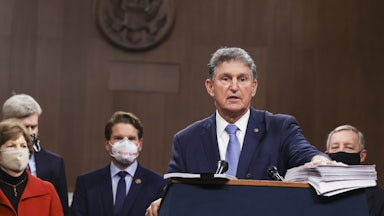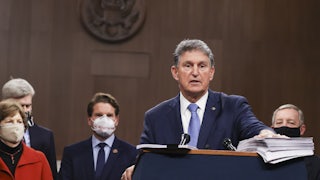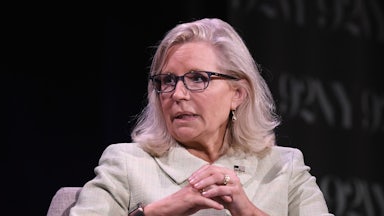President Joe Biden meets with Vladimir Putin Wednesday, and he has vowed to communicate some stern messages to the Russian leader about the latter’s efforts to undermine democracy.
This work began over the weekend: Biden has been at the G7 urging European leaders to join him in investing in the developing world on a massive scale to counter China’s Belt and Road Initiative and prove to the world’s peoples that democracy works. (Up next is a NATO meeting in Brussels, where they’ll talk Russia, climate change, and Afghanistan.)
These are necessary messages—to Putin and in Brussels, Biden is saying that the legal processes of democracy must not be corrupted. To his democratic European counterparts in Cornwall, he emphasized the relationship between democracy and economics. It’s good that he’s saying these things. I just can’t help wishing he’d say them more forcefully here at home.
To some extent, Biden is caught in a trap; a trap that he has, in part, waltzed into. It can be summarized in this question: How can he explain to Americans that the Republican Party has become an authoritarian and anti-democratic beast with which genuine cooperation is basically impossible, while simultaneously trying to cooperate with it?
This dilemma is most clearly on display with respect to the ongoing infrastructure negotiations. Biden and his team keep saying they’d like a bipartisan bill. I’m sure their polls show them that most people support that, because most people still don’t seem to understand what the GOP has become.
So for whatever reason, Biden sees the need to try to strike a deal. If the current Senate negotiators actually cut one, he’ll have left himself no choice but to sign it.
On the one hand, that’s … OK. It would be a big price-tag reduction, from $2.2 trillion to $1.2 trillion. But $1.2 trillion is still a lot of cabbage. As a point of comparison, I went back and looked up the price tag of the major Obama-era infrastructure bill, the “infrastructure bank” idea co-sponsored by John Kerry and Kay Bailey Hutchison, which was unveiled at a Capitol Hill press conference I remember attending and which, of course, went nowhere. It was $10 billion.
So $1.2 trillion will build some stuff. But at the same time, it doesn’t meet the country’s needs at all. Worse still, a bipartisan deal would enable Republicans to claim some credit. Biden would hold a signing ceremony in which he’d glad-hand Mitt Romney and pass out pens to Democrats and Republicans alike.
How do you explain to the American people that the other party is a mortal threat to democracy when you just struck a deal with it, making it look to people who don’t pay a lot of attention, which is most people, like everything’s normal?
It’s hard. It may not be impossible. There are so many fronts on which Republicans are mounting a daily assault on democracy that there are plenty of other apples in the barrel to pluck. Republicans from more and more states are shuffling out to Arizona to study the ways of that state’s unhinged “audit” mongers to learn how a legitimate election result might be undermined, if not reversed, and lay the groundwork for the coming Grand Theft Election of 2024. Additionally, there is a massive effort underway to pass voter suppression laws, enacted so far in 14 states, with many more on the wing.
The administration is fighting this. It was good to see Merrick Garland announce last Friday that he’s doubling the number of people on the Justice Department’s staff who fight voter suppression. But the Biden administration and Democrats need to be much more forceful in public about what remains the obvious number one issue on their agenda.
Fighting against voter suppression means fighting against Republicans, but it means pressuring some Democrats, as well. It seems inconceivable that while Biden is out telling the rest of the world that we’re locked in an existential confrontation between democracy and authoritarianism, some members of his own party can’t see the contours of the battle here at home. But it’s evident nonetheless.
Joe Manchin is the obvious first target. He really does seem willing to let the Republicans rig democracy even as he claims to be defending it. While we’re on the subject—and this is a point I haven’t seen made often enough, to my reading—this whole elaborate bipartisan dance on infrastructure? That is almost wholly for Manchin’s benefit. The White House needs to prove to him that it tried and tried, and tried, and tried to get 10 Republicans to sign on to the deal, because it seems that only after Manchin is satisfied that the White House has wooed the GOP in every conceivable way, all to no avail, he might finally go along with a Democrats-only reconciliation measure.
Kyrsten Sinema, the other senator most strongly associated with blocking her party’s agenda, is now facing some pressure in Arizona, thankfully. Last week, a majority of the state’s Democratic state legislators sent her a letter saying, basically, cut the crap and take action on the filibuster. She’s not up for reelection until 2024, but whatever power liberals in Arizona have, now’s the time to exert it.
And finally, there’s Dianne Feinstein, with her imperishable remark last week that “if democracy were in jeopardy, I would want to protect it,” but “I don’t see it being in jeopardy right now.” Dear God. Where was she on January 6? Having a bowl of bean soup with her pal Chuck Grassley?
Democracy is under threat worldwide. It’s good to see the leaders of the democratic world, however belatedly, awaken to this reality. But it’s awfully hard to fight the global threat when the greatest threat to the world’s oldest democracy is not external but internal. And it’s harder still when some of the people who choose to blind themselves to that threat are members of the party that’s supposed to be in the defending democracy business.








